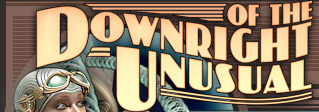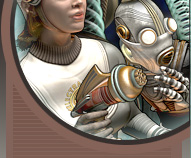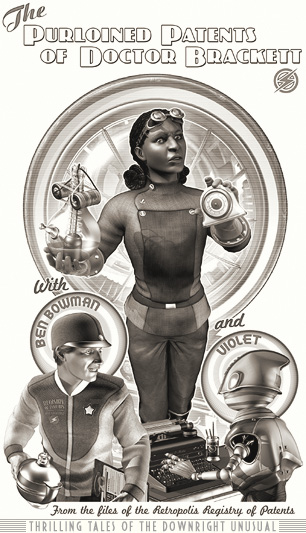Once the Registrar started playing with his pen, Ben was on familiar ground. The thing about familiar ground, though, is that it’s just familiar. There are a lot of places that are familiar, but which you’d rather not visit again. The new Registrar’s pen, when he was playing with it, was the signpost for a place that Ben Bowman knew, and dreaded, and tried to avoid.
Before Mr. Balasco could share his thoughts, Ben leaned forward. “It’s not really about the preliminary patent applications. We don’t even need the preliminary patent applications. We just ask for them so we have some advance warning if, say, some inventor decides to see what happens when you solidify the Earth’s core.”
Mr. Balasco stared, blankly, the pen now immobile in his fingers.
Ben waited. When waiting didn’t help, he explained: “That would be very bad, sir.”
“Well, we wouldn’t want that, would we? Still, think how much more streamlined the whole process would be if we eliminated those preliminaries, with all their paperwork.”
The pen was moving again. Ben tried not to follow it with his eyes.
“But… sir, the whole point of the preliminary applications is that we find out, ahead of time, what the scientists are doing. Before one of them does solidify the Earth’s core. Which would destroy the magnetic field that holds our atmosphere in place. Which, as I mentioned, sir, would be very bad. Anyway, like I said, it’s not really about the preliminary applications. It’s about the complaints.”
“We’ve received complaints?”
“As I was just saying, sir. Twenty-seven inventors in the District have lodged complaints against Dr. Brackett. They think she’s stolen their ideas, even though they’d already filed their preliminary applications. But in almost every case they’ve withdrawn their complaints shortly afterward.”
Mr. Balasco nodded.
“In three cases the scientists disappeared, sir.”
Mr. Balasco put down his pen. “I think you’re getting worked up over a very small incident, Ben. Once these complaints were withdrawn, our job was done. And I’m sure you have a lot of other work to do.” His fingers strayed over to the pen, and he picked it up again. It started to twirl. “I should think that three fewer scientists in the District would be more a relief, than anything else, anyway.”
“Well, I can understand that, sir, but it sets a disturbing precedent. If their little feuds and rivalries should ever flare up into an actual war, then it’s likely to spread outside the District. You can’t contain the… the giant robots, and the death rays, and the sonic destabilizers they have in there. Not with anything they’ve invented for us.”
Ben waited for that to sink in, which it didn’t. “We’re here to register their inventions, sir, and that’s a great service to the city. Once those new gadgets are licensed and manufactured they’re… of considerable benefit. But the thing is – as I think you’ll see in your briefing – our first duty is to contain the scientists in the District. To prevent their inventions and their arguments from… well, sir, to prevent them from getting out and killing the rest of us. To put it plainly.”
“Oh, I’ve read the briefing,” Mr. Balasco said. “Of course I’ve read it.”
Ben didn’t comment.
“All right, investigate it if you think it’s necessary. Naturally I respect your long service and… and your qualifications. Just try to wrap this up quickly, will you?”
The pen was rolling from finger to finger, a disturbing barometer of innovations to come.
“Yes, sir. That’s my plan.”
Ben nodded to Violet, Mr. Balasco’s secretary, as he closed the door. She tilted her enameled head and let one eye dim slightly in a wink. “He’s having ideas?” she asked.
“The pen.”
“I’ll take in a stack of reports, then. That’ll hold him for the afternoon.”
Ben gave her a smile. “Thanks, Violet. That’d be swell.”
His smile nearly lasted until he’d reached the boundary of the Experimental Research District, where the mass of Retropolitan pedestrians thinned, quite suddenly, in an illustration of survival instincts at work. It was all laid out in the Zoning regulations, but on a one-to-one level people didn’t even need to be told. The frequent explosions were more of a reminder than anybody needed.
Ben stopped across the empty street and steeled himself for the most frightening experience a Patent Registry investigator could face.
The Experimental Research District was one of the largest neighborhoods in all of Retropolis, roughly in the center of the city that sprawled for hundreds of miles in every direction. The District was at once the engine that drove the city and the greatest threat to its safety. The great towers, the monorail system, the lighter-than-air buildings and vehicles could all be traced back to the patented inventions that Ben, and other officers, processed. The District was the source of all that frenetic invention.
It wasn’t a lovely neighborhood; it wasn’t even slightly attractive, like the neighborhood where Ben lived. The District was a warren of lead-shielded, armored bunkers: of laboratories, in other words. Each scientist lurked behind reinforced walls that protected their laboratories from the experiments next door, and which might just protect the laboratories next door from what was going on inside. But their defenses weren’t perfect. Billowing clouds of fumes often bellied out over the rooftops; there was a nightly light show, with unidentifiable rays shooting out into the clouds – to what effect, no one outside the District could say – and there was also the constant din of construction, since so many laboratories suddenly became steaming craters and were, almost immediately, rebuilt for their new occupants. There was a tremendous amount of turnover in there.
It wasn’t a neighborhood that many people would care to join. But the scientists who did live there wouldn’t want to live anyplace else. By statute, they couldn’t live anywhere else. So it worked out pretty well for everyone.
Ben saw a courier fly in on her scooter, keeping to the area directly above the District streets because you didn’t want to cause any confusion about the airspace over the laboratories.
He took a deep breath. Then he crossed the street and took the shortest possible route to Doctor Hamilton’s laboratory.
A successful Patent Investigator knew all the shortest possible routes.
June 25th, 2016 at 10:54 pm
Ah, it’s nice to be back, typing that response to ‘complete this sentence’. It’s been too long. But to my question: I supposed I could have wondered this a while ago, but, how do your characters pick their names? Lots of ‘b-alliteration’ going on here and it got me to wondering.
June 26th, 2016 at 8:18 am
I don’t know where Ben’s name came from. It’s just one of those that seemed inevitable once I saw it. I have no explanation for Registrar Balasco, either.
But throughout these stories we’re going to see a whole bunch of names that come from vintage science fiction writers and the artists who illustrated them. That seems to be my current phase, following the (probably more obscure) industrial designers and British bandleaders of the 20’s and 30’s that I’ve often used before.
These aren’t meant to be the actual people whose names I’ve appropriated. I just like to think of their family names showing up in Retropolis.
July 23rd, 2016 at 11:37 pm
…returning after an unavoidable delay, I’ve started the story over. FYI, your ‘Purloined Patients’ graphic still links to the Clockwork Book story. One has to go to the ‘Start’ link to get into the Purloined Patients story. This may just be a ‘design feature’, but I thought I’d mention it…
July 24th, 2016 at 9:06 am
Oops, I forgot there were three links on that panel. Just made a note of it; thanks!




